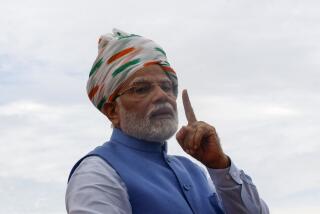Montenegro Rejects Yugoslav Army’s Censorship Demands
PODGORICA, Yugoslavia — Independent radio stations and civilian authorities, fighting a risky battle to preserve democratic freedoms in Montenegro, on Saturday rejected army demands that local rebroadcasting of foreign news programs be halted.
“We are not going to change a thing,” declared Tanja Knezevic, editor in chief of Montena Radio, one of the broadcast outlets targeted in the attempted Yugoslav army crackdown. “The intention of the army is to provoke the government. They’re doing it through us.”
The government of reformist Montenegrin President Milo Djukanovic--locked in what has so far been a nonviolent power struggle with Yugoslav 2nd Army forces stationed here--issued a statement Saturday repudiating an army demand requiring all broadcasters to stop transmitting such foreign news programs as reports from Voice of America, Radio Free Europe and the BBC.
Montenegro and Serbia together constitute the Federal Republic of Yugoslavia, which has military forces stationed here under the command of a hard-line general recently appointed by Yugoslav President Slobodan Milosevic.
The army issued its decree against foreign rebroadcasts Friday, basing its authority on a “state of war” declared by the government in Belgrade, capital of both Serbia and Yugoslavia. Under the Yugoslav Constitution, during a state of war the army takes over administrative authority from civilian institutions.
“You are openly conducting enemy propaganda,” the army said in its order to radio editors. “By doing your work the way you are doing it, you will be responsible for violating the Common Defense System and weakening the fighting force of the Yugoslav Army, which can result in banning your radio station and other measures we are taking against those who commit wrongs during the war.”
The army has already set up military courts in Montenegro to hold trials of draft dodgers, and, according to Montenegrin media, it has plans to start military trials of people suspected of treason and espionage, with its authority to do so based on Belgrade’s declaration of a state of war.
Montenegrin authorities, however, have not recognized the legality of the federal Yugoslav government since last year, on the grounds that constitutional procedures were violated in the selection of current federal authorities.
Since it considers the federal government illegitimate, Montenegro also does not recognize the state of war. This refusal has allowed the democratically elected, pro-Western government of Djukanovic to remain in power even after the North Atlantic Treaty Organization launched its air campaign against Yugoslavia on March 24.
Both sides see far more at stake than the rebroadcasting of foreign news reports. If the army’s authority to control radio broadcasts was recognized, that could be seen as undercutting Montenegro’s rejection of a state of war. That, in turn, might mean conceding the military’s right to control Montenegro’s entire government.
“This issue has much wider implications,” said Nebojsa Redzic, editor in chief of Radio Free Montenegro. “We have parallel authorities here in Montenegro. We have authorities of the Yugoslav army on one hand and authorities of Montenegro. This issue is providing an answer to the big question: Is Montenegro accepting the state of war declared by the federal authorities? If we accept what the army is asking of us, that would basically mean Montenegro is agreeing to the state of war.”
Even the man who would be Montenegro’s king, if this were still a kingdom, entered the fray Saturday.
“Montenegro today is caught between two bad options: the politics of ultranationalist Milosevic and the ultra-militarism of the international community,” Nikola II Petrovic Njegos, the grandson of Montenegro’s King Nikola I, said at a news conference in Podgorica.
“We have to find some third way, a way for the future, a way out,” said Njegos, a French-born architect who lives in Paris and has dual French and Yugoslav nationality. “It’s important for all of us to make an effort to stop repression of the media and of society. Montenegrins should resist all the pressures coming from outside.”
The government statement issued Saturday noted that Montenegro’s media law does not allow “anyone to illegally limit the freedom of public information.” The Montenegrin government has notified the 2nd Army command that there are currently no legal grounds for banning rebroadcasts of foreign programs, it said.
Through this statement, the government “gave us support to continue and basically rejected admitting that Montenegro is in a state of war,” Redzic said. “They showed willingness to try to stop the army from taking over the media in Montenegro.”
Redzic said he had “absolutely not” changed anything in his own station’s broadcasting in response to the army’s demand.
“We think Radio Free Europe and its information--and other foreign media whose programs we rebroadcast--not only is not enemy propaganda but is extremely professional and is necessary for the people of Montenegro to understand the problem and what’s caused this war situation,” the editor said.
Veselin Tomovic, editor in chief of Antena M, another independent radio station that is refusing to cave in, said that “when the army tries to stop the democratic process, it’s very, very dangerous.”
Tomovic responded to the army’s demand by broadcasting a tough commentary warning his audience that Montenegro’s relative peace is no cause for great comfort and that the time to stand up to Milosevic and his army henchmen is now.
“I said to my listeners: ‘Take your mirror and ask yourself, are you a fascist too?’ ” Tomovic said. “If you are a sheep, and you are not being butchered now, and other sheep are going to the factory, it’s not good. Because in the future, you could be one of them.”
More to Read
Sign up for Essential California
The most important California stories and recommendations in your inbox every morning.
You may occasionally receive promotional content from the Los Angeles Times.










